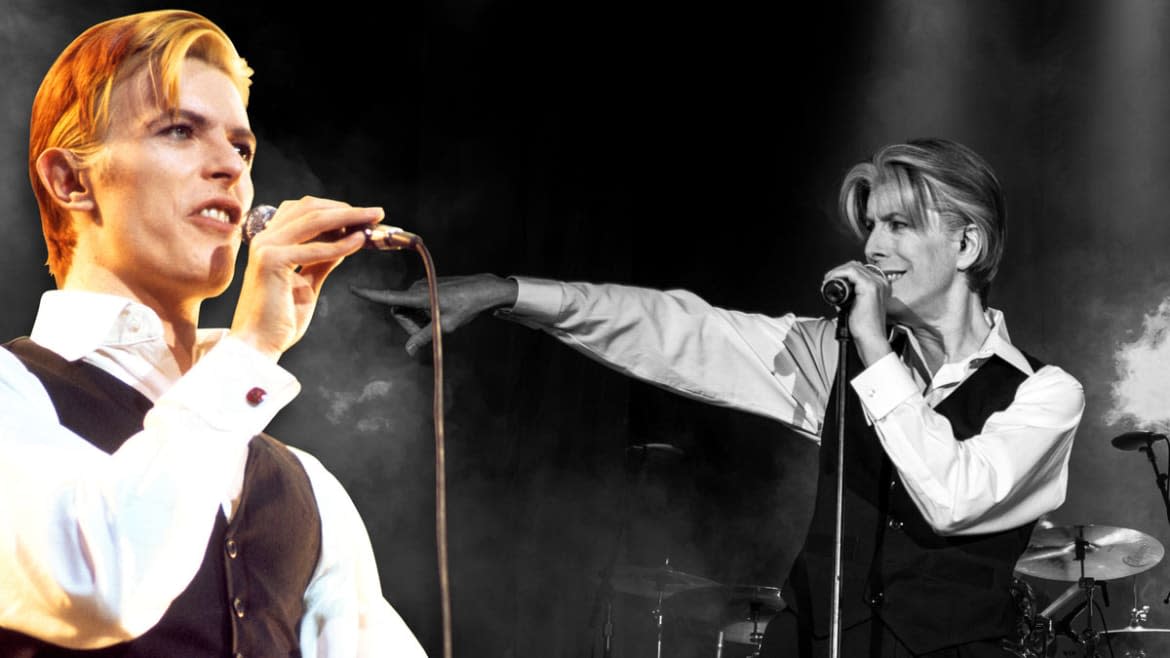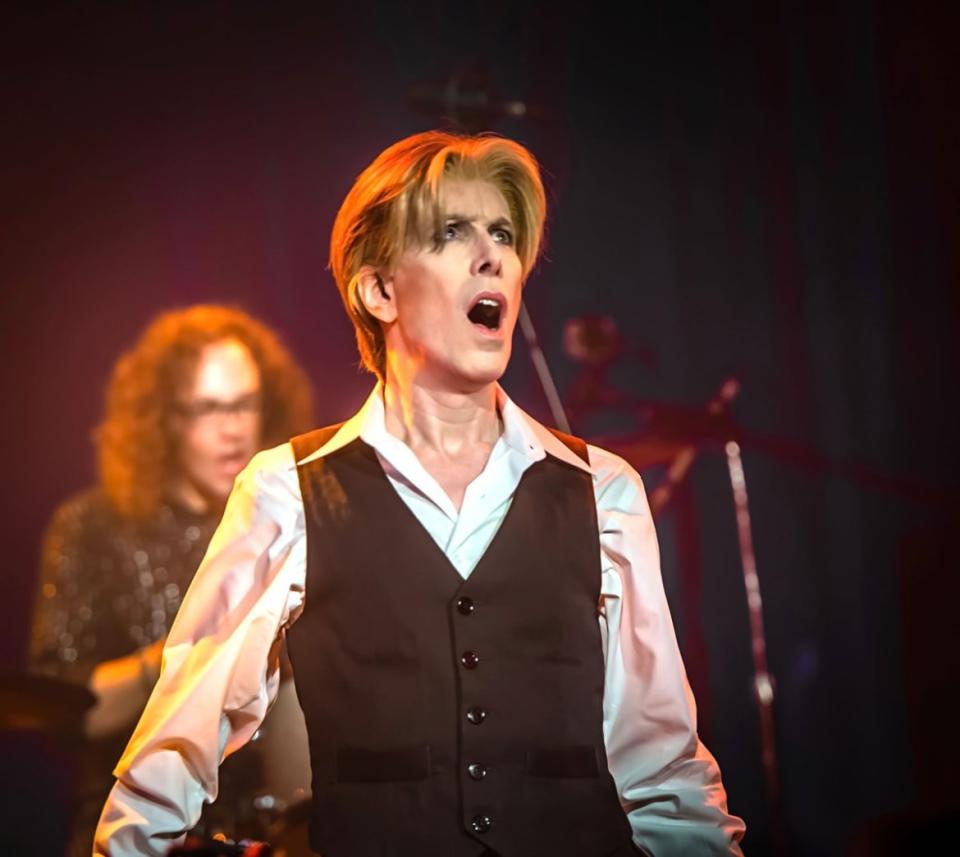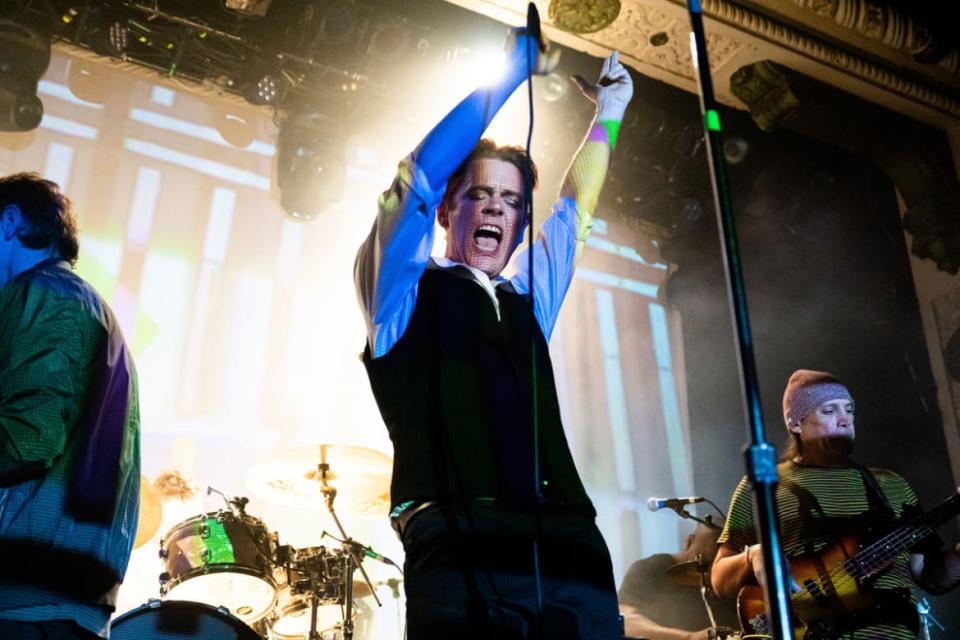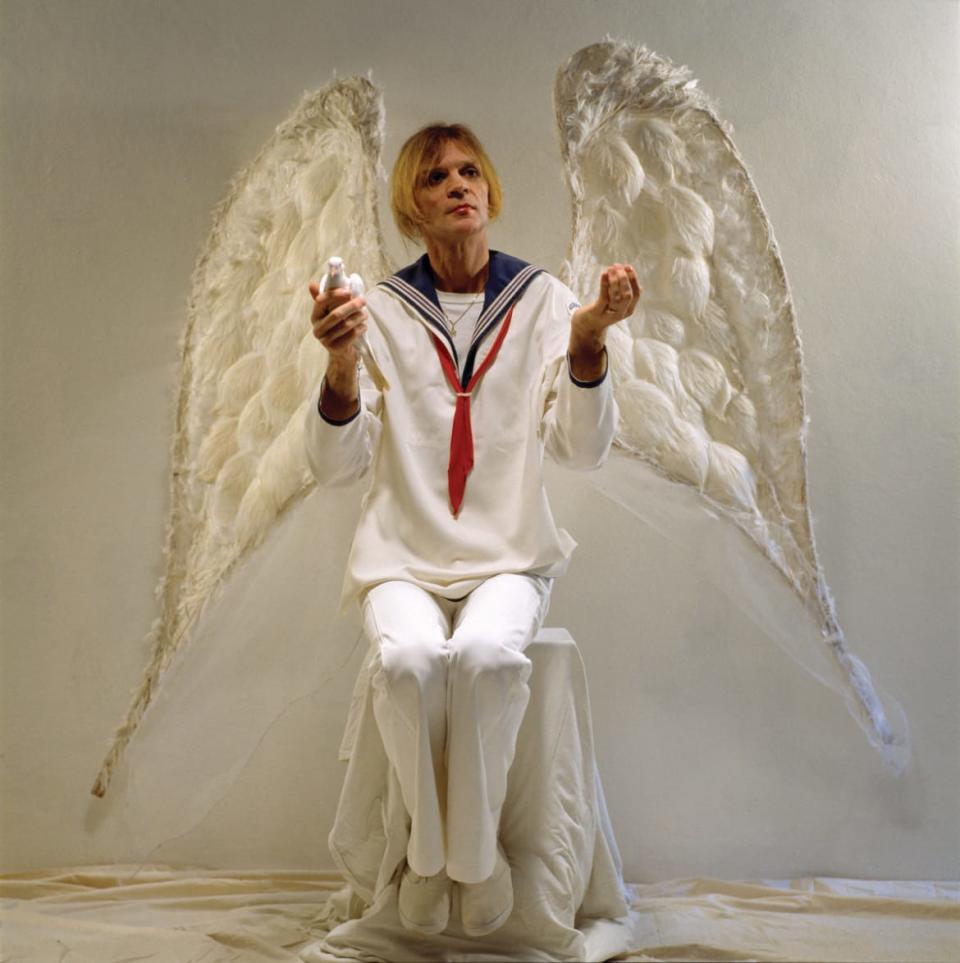The David Bowie Copycats Keeping the Music Legend’s Legacy Alive

- Oops!Something went wrong.Please try again later.
On Jan. 10, 2016, David Brighton’s phone began ringing as fans began sending the musician consolatory messages. At this point he had been making a living as a David Bowie impersonator for over a decade and, thanks to his appearances as the icon in the 2009 film Watchmen and his stage show “Space Oddity,” was considered one of the best in his line of work. But suddenly, as his hero passed away from cancer at 69, the gig had changed.
“When I found out, I was in shock,” Brighton recalls. “People are appreciated after they’re gone, sadly, sometimes more than they were at the time. I remember the first time we toured Europe [after Bowie’s passing], one of the criticisms we got was, ‘This is distasteful, doing a David Bowie tribute so soon after he died.’ They were under the impression that we had just formed this act as a response to him passing. We’d been doing this act for 15 or so years prior and David Bowie himself was supportive.” Only “a small portion” of fans felt that way, though. “The much larger percentage was coming to our shows to grieve, and to heal.”
Tribute acts often deal with the perception that they’re somehow lesser for playing another artist’s back catalogue. But there was plenty of evidence to suggest that Bowie loved his doppelgangers, from his own desire to be larger than life (“I felt very puny as a human,” he once remarked. “I thought, ‘Fuck that. I want to be a superhuman’”) to the times he trotted out his own impersonators onstage. More than that, Bowie understood their cosplay. After all, what were Ziggy Stardust and Thin White Duke if not opportunities to express creativity through different personas?

While not as ubiquitous—and certainly less maligned than Elvis impersonators—there are still plenty of David Bowie-inspired acts populating pubs and concert halls with their takes on his genre-gobbling catalogue. And as many have discovered, actively participating in their appreciation of Bowie has created unexpected opportunities for creative growth. Still, it takes a lot of work to slip into his multi-colored jumpsuits.

Chris Connelly, frontman of the Chicago-based tribute act Sons of the Silent Age, says that his aim is to create a performance more in line with Todd Haynes’ 1998 film Velvet Goldmine than a sense of documentary realism. His work as a musician has included stints with industrial bands Revolting Cocks and Ministry, the latter of which counted Bowie as a fan. But gathering like-minded musicians to perform Bowie’s music in the early 2000s meant Connelly was forced to throw acting into the mix.
“I didn’t know the real David Jones, I knew him from his character,” Connelly says. “I play the character, which is a wonderful thing to do because it means that I don’t feel self-conscious about it. It’s more of an acting challenge from someone who’s not an actor. If I mess up, it’s not me that’s messing up, it’s this person who’s trying to impersonate the Thin White Duke.”

Despite his desire to mirror Bowie as closely as possible, Brighton faced a similar challenge. With the music legend’s training in mime work and his interest in Kabuki and theater, assuming his persona meant internalizing a wealth of skills. Brighton admits that sometimes the muscle memory of his performances gets the better of him offstage.
“Had I known how difficult it was going to be to impersonate David Bowie, I never would have undertaken the task,” he jokes. “I remember meeting Elvis impersonators when I was doing Beatles [tributes] who were committed. It was just, ‘Dude, you’re not on stage right now. Can you drop the Elvis act? It’s sort of annoying.’ But now I realize it’s not always intentional. It’s just something that you’ve incorporated, this vast repertoire of movement and performance and skills and ways of speaking and everything—you just built it into your soul somehow, and it comes out, even when you don’t need it to.”
Brighton had the opportunity in 2003 to do his impersonation in front of Bowie himself on the set of a French Vittel TV commercial. It was a “surreal and humiliating” experience, he recalls, while quickly adding that the singer was also a perfect English gentleman.
For other cover artists, emulation alone isn’t the goal. Jeff Duff, an Australian performer with a prolific back catalogue of original work, has performed tributes to a number of stars. But it’s his cabaret take on Bowie, including the Sinatra/Bowie mashup Ground Control to Frank Sinatra, that continues to resonate with audiences. A contemporary of Bowie’s during his time living and performing in England in the 1980s, and later a next-door neighbor to the music icon in Sydney, he’s just pleased his Bowie act has been a turnkey to continuing his decades-long career. The people want Bowie and he’s happy to give it to them.
“I couldn’t even impersonate me!” Duff laughs. “When I lived in London in the 1980s, I wouldn't have done any David Bowie songs.” But parallels between his look and Bowie’s caught the eye of casual observers. With his “tall, thin” frame and his love of makeup and “flamboyant” clothes, he admits, Bowie’s “character suits my character perfectly.”

Likewise, Jane Roberts, the frontwoman of Miss Bowie, found an unexpected sideline when, at the age of 36, she started learning how to play guitar and began playing “Five Years” at open-mic nights around Nottingham, England. Shortly after Bowie’s death, she formed a band with musicians in their forties and fifties who shared her desire to celebrate his music. Although she felt empowered by the prospect, the Thin White Duke-channeling performer found a unique challenge—convincing fans that as a woman she was worthy of stepping into the gender-bending musician’s shoes.
“It is a tale as old as time, isn’t it?” she says. “You’re a woman with a different level, with the added bonus of impersonating a man. Sometimes you get people that come to the gigs especially to watch you fail because you’re a woman singing Bowie. But we do get people who come to the gigs and say, ‘I had to see this because I didn’t believe that it’d be any good. But I really like you!’ You kind of change people’s minds and change people’s perceptions. And that happens on a fairly regular basis. Which is nice because it means that people have at least tried and come with a fairly open mind. But it’s just the same challenges women get with anything else, really. It’s just that extra questioning of whether what you’re doing is valid.”
It’s the power of hearing these songs live that ties tribute acts together across their myriad incarnations. Nailing a template created by a legend is a challenge. But along with bursts of creative confidence and increased opportunities to tour, there is a sense of community that comes with performing in these acts.
During his lifetime, David Bowie’s approach to music and art unified those who felt pushed outside of societal definitions of “normal.” Even now, five years after his passing, he still brings people together. Connelly recalls Sons of the Silent Age’s first show shortly after Bowie’s passing, with special guests Ava Cherry and Billy Corgan, as one of those moments where that connection was fully realized.
“That night was really cathartic for a lot of people,” he remembers. “It was the major loss in modern music for our times. And he meant so much, in so many dimensions, to so many people that it was something big being taken away from us. Just giving people that courage to change. There was a lot of tears shed in the crowd I saw.”
“In a sense, we're not replicating a David Bowie show,” he adds. “We are merely the Charles Mingus orchestra or something like that. We are keeping his music as disciples alive, and interpreting it, perhaps in a way that he might have done. And since he’s died, we have a very faithful bunch of people who come. And it makes people feel good. It makes people feel better.”
Get our top stories in your inbox every day. Sign up now!
Daily Beast Membership: Beast Inside goes deeper on the stories that matter to you. Learn more.

